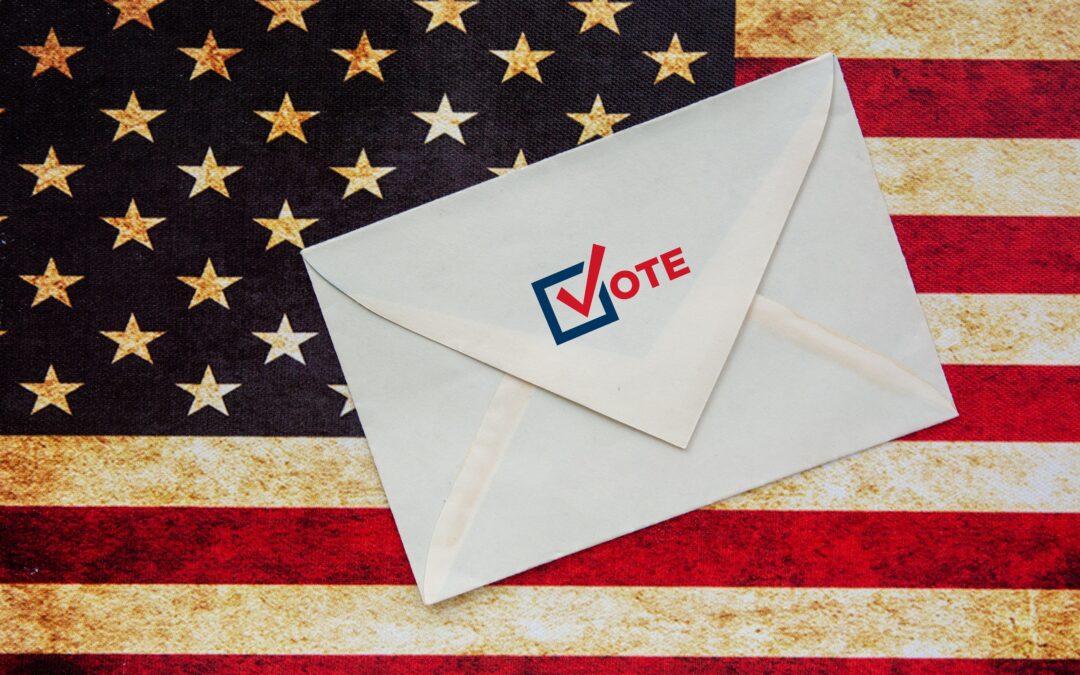
by admin | Sep 28, 2023 | Elections, News and Updates
For months we have been hearing that a small group of disgruntled political consultants and power-hungry politicians would be releasing their plan to scrap our century-old primary and general election system in favor of a confusing jungle primary/ranked choice voting scheme that will disenfranchise voters and empower special interests.
Well last week a group called “Save Democracy Arizona” rolled out their proposed election reform ballot initiative, and it is about as dysfunctional a plan as what we expected.
Reading through their proposed constitutional amendment, a sprawling 4 pages of poorly written language drafted in secret, it is abundantly clear that this won’t make elections any more transparent or fair except for the special interests who support it. And it does far more to disenfranchise voters and destroy democracy than actually save it.
The first major change included in the proposed initiative is the creation of a jungle primary. If this sounds familiar, that may be because California uses a jungle primary system. That’s right, we are now importing California solutions to “fix” our electoral process. Plus, voters in Arizona overwhelmingly rejected a jungle primary ballot measure a decade ago.
Under a jungle primary, every candidate—Republicans, Democrats, Libertarians, No Label Party, and Independents—would now appear on the same “primary election” ballot. The winners of the primary then would advance to the general election.
Who gets to decide who the primary winner is? The legislature, who can allow as little as two and as many as eight candidates to advance to the general. If they decide to allow three or more, the legislature must then allow for the ranking of those candidates—thus implementing Ranked Choice Voting (RCV).
So, the measure includes both California-stye jungle primaries and Alaska-style ranked choice voting, all built on the same baseless and flawed complaints about our election system that they have been making for years.
They argue that primary elections result in divisiveness, leading to a small fraction of the most partisan voters determining the outcome of elections. But California Democrats quickly learned the same was true for Jungle Primaries after their voters enacted it, where candidates from only one party advance to the general election ballot in some races, stripping voters of any choice at all.
On top of this, Jungle Primary proponents argue that independent voters (now a third in Arizona) don’t have a voice in the process. But independents do get to vote in our primary elections now, they just have to decide whether they want to vote in the Republican or the Democrat primary – not both. Plus, Independent candidates get to bypass a primary election altogether, collecting more signatures but then advancing straight to the general election ballot—a pathway that partisan candidates can’t pursue.
Finally, one third of voters being “independent” means that two thirds, a supermajority, do associate with a political party. So, this whole multimillion dollar effort to completely change our elections is purportedly built on a block of voters, in the extreme minority, that campaigns spend significant amounts of time and money courting in every election.
In other words, these voters are not ignored, and they do have a voice—arguably an outsized one. The truth is that Jungle Primaries and RCV aren’t for independents. They’re for special interests who can’t win elections without changing the system.
The good news is that despite months and months of planning, the proponents are divided and have split. Just days after Save Democracy filed “Make Elections Fair,” Voter Choice AZ announced they will not be supporting it and will instead move forward with filing their own initiative.
For either to be successful, they’ll need to compete to raise millions to collect the necessary 383,923 signatures, plus a couple hundred thousand safety net. And then they will have to convince voters to support it—voters who have been hearing about the problems of RCV for months.
Help Protect Freedom in Arizona by Joining Our Grassroots Network
Arizona needs to have a unified voice promoting economic freedom and prosperity, and the Free Enterprise Club is committed to making that happen. But we can’t do it alone. We need YOU!
Join our FREE Grassroots Action List to stay up to date on the latest battles against big government and how YOU can help influence crucial bills at the Arizona State Legislature.

by admin | Sep 21, 2023 | News and Updates, Tax
If someone in the private sector illegally took money that didn’t belong to them and then refused to return it, what do you think would happen? They could be heavily punished with fines. They could face sanctions. They could even end up in jail, depending on the offense.
But for about a year and a half, Pinal County has been allowed to drag its feet in refunding $80 million that it illegally collected from taxpayers. It’s just another example of government officials who think they are above the law.
This all started back in 2016 when Pinal County officials proposed a $640 million transit tax hike to voters in order to fund a wide array of transportation projects throughout the region. But after unveiling the plan, the county faced strong opposition from retailers, home builders, auto dealers, and multiple taxpayer watchdog groups.
This should’ve been enough for county officials to recognize that the community didn’t support their proposal. But they were too committed to their scheme. So, what did they do? They developed a new plan to buy off their political opponents by adding a special carve-out for purchases that exceeded $10,000 from paying the new tax. That’s a bold strategy, isn’t it? It’s also illegal.
Because the new tax would only apply to retail sales below $10,000, it meant that the day-to-day purchases of lower-income citizens would be more heavily taxed than more expensive items. But capping the tax in such a way isn’t authorized by Arizona statute. That’s why the Goldwater Institute—supported by the Club every step of the way—challenged the Pinal County transportation tax in court. And in March 2022, the Arizona Supreme Court ruled against the tax in a big win for taxpayers.
That should’ve been the end of it. Pinal County officials should’ve immediately begun working on a plan to refund the money to taxpayers. And yet, nothing but crickets for the past 18 months. The reality is that the Arizona Department of Revenue and Pinal County haven’t taken any steps to even allow people to apply for refunds. And at the end of last month, ADOR announced that it was pausing any plans to send the money out because it did not receive clarity from Pinal County on how to do so.
This is outrageous! And more than likely, it’s completely by design. Pinal County officials think that if they delay long enough, they will be able to keep the $80 million. After all, they had a bill introduced during the last legislative session that would have allowed them to do just that. That bill went nowhere, just like the illegally collected taxpayer money the county has been holding in an interest-bearing escrow account.
Now, the Goldwater Institute has gone back to court to force the refunds to occur. And once again, the Club will support this effort by whatever means are necessary. Pinal County officials had no right to take this money. And they certainly have no right to keep it. Taxpayers are legally entitled to these refunds. And if Pinal County refuses to do the right thing, it’s time for the courts to step in and force them to.
Help Protect Freedom in Arizona by Joining Our Grassroots Network
Arizona needs to have a unified voice promoting economic freedom and prosperity, and the Free Enterprise Club is committed to making that happen. But we can’t do it alone. We need YOU!
Join our FREE Grassroots Action List to stay up to date on the latest battles against big government and how YOU can help influence crucial bills at the Arizona State Legislature.

by admin | Sep 14, 2023 | Elections, News and Updates
Secretary of State Adrian Fontes appears to be in a tug-of-war with Governor Katie Hobbs to determine who is worse at their job. It’s been well-documented that since she took office, Hobbs has been off to a rough start with high-profile staff exits, breaking the veto record after killing the bipartisan “Tamale Bill,” and alienating many Democrats by signing the Republican budget. But over the past eight months, Fontes has been working just as hard in the battle to see who’s more incompetent. Not only has he failed to perform the necessary voter list maintenance—leaving 14 Arizona counties in violation of Section 8 of the National Voter Registration Act—but he rushed through a version of the Elections Procedures Manual (EPM) that is filled with unlawful provisions.
Now, Secretary of State Fontes has been dealt another major blow after a superior court judge ruled that he and his predecessor (now-Governor Katie Hobbs) enforced an EPM requirement that contained an unlawful voter signature verification process.
Currently in Arizona, early ballot voters are only required to prove their identity by signing the exterior of the envelope that contains their ballot. That process is already problematic enough, which is why the Free Enterprise Club has been a strong advocate for universal voter ID in elections. But Hobbs’ EPM, which has been upheld by Fontes, essentially rewrote state law to make invalid voting easier.
Under Arizona statute, an envelope signature is supposed to match the signature on the voter’s registration record. If it doesn’t, the country recorder must contact the voter, advise the voter of the inconsistent signature, and allow the voter to correct or the county to confirm the inconsistent signature. But Hobbs’ EPM instructs county recorders to validate early ballot affidavits if they determine the signature matches any election-related document available to them. This not only rewrites state law regarding signature verification for mail-in ballots, but it creates a process that invites dubious methods and opportunities for abuse during the signature review process.
That’s why the Free Enterprise Club filed a lawsuit against Secretary of State Adrian Fontes after he failed to reject Hobbs’ EPM earlier this year. Fontes and a left-wing group called Mi Familia Vota (represented by Hillary Clinton Lawyer Marc Elias) responded by filing a motion to dismiss, claiming to the court that the term “registration record” was ambiguous and up for interpretation. Essentially, they were arguing that he could decide what constituted a valid signature record for the purpose of verifying a ballot signature. On top of that, Fontes petitioned the court to interpret the law to mean that other documents could be included in the definition of “registration record.”
But Judge John Napper saw through those arguments and rejected Fontes’ motion to dismiss earlier this month. He told Fontes that the statute is clear and unambiguous, and he stated that only a voter’s signature used to register to vote is valid.
While the case isn’t over yet (we anticipate that Fontes will appeal), this is a great development as we move forward. The judge ruled in our favor on all questions of law. And we will keep fighting this case all the way to the Supreme Court to ensure a final victory for the integrity of our elections.
Help Protect Freedom in Arizona by Joining Our Grassroots Network
Arizona needs to have a unified voice promoting economic freedom and prosperity, and the Free Enterprise Club is committed to making that happen. But we can’t do it alone. We need YOU!
Join our FREE Grassroots Action List to stay up to date on the latest battles against big government and how YOU can help influence crucial bills at the Arizona State Legislature.

by admin | Sep 7, 2023 | Misc, News and Updates
For local governments—and councils of governments—in Arizona, it appears that creating a climate action plan has become all the rage. Maybe that’s because it pays well.
The latest group to bow down at the altar of the Biden administration’s climate change agenda is the Maricopa Association of Governments (MAG). Back in August, MAG received a $1 million grant from the Environmental Protection Agency’s (EPA) Climate Pollution Reduction Grant Program to serve as the lead planning organization for the Phoenix-Mesa-Chandler metro area. The grant requires MAG to develop a priority climate action plan by next March, a comprehensive climate action plan by 2025, and a status report in 2027 after the four-year grant period expires.
But this $1 million grant isn’t the only way MAG stands to benefit.
The development of a priority climate action plan is simply a prerequisite for phase two of the EPA’s grant program, which concerns implementation grants for greenhouse gas emissions reduction policies, programs, and projects. And that could lead to MAG overseeing up to $4.6 billion in federal funding. Now, we see the true motivation.
All of this builds off what governments in Tucson, Tempe, and Phoenix have already passed in their respective cities. Earlier this year, the city of Tucson finalized its climate action plan to the tune of $326 million. And it’s ripe with Green New Deal mandates that are aimed at controlling citizens’ lives, forcing them out of their cars, and destroying the community.
Then, there’s the Tempe City Council which claims to have created a road map to address the immediate threat of “extreme heat.” As part of its plan, the city will be implementing green codes and standards that it believes will create a more walkable and cooler Tempe. Maybe someone should tell the Tempe City Council that we live in a desert and the so-called “extreme heat” they think they can control has always been a normal part of Arizona summers.
Of course, we can’t forget about Phoenix, where Rep. Ruben Gallego has also jumped on the “extreme heat” bandwagon by lobbying for more federal dollars to counter it. And Mayor Kate Gallego has urged the Biden administration to declare Arizona’s heat a federal emergency to, you guessed it, grab more federal funding. The City of Phoenix passed its climate action plan in 2021 with a goal to reduce emissions by 50 percent by 2030 and achieve net-zero emissions by 2050. Keep in mind that this is the same Phoenix that implemented “cool” pavement that is making people hotter and wants to eliminate parking spaces in an effort to become a 15-minute city. And on top of that, its current mayor is helping to lead a globalist effort to ban meat, dairy, and private cars by 2030.
This is the agenda MAG has chosen to join. Now, with this grant, it will be actively working with the rest of the cities in Maricopa County to adopt climate action plans just like these. And with that, MAG has made its true motivations clear. It is nothing more than a puppet for the Biden administration and the Left.
Help Protect Freedom in Arizona by Joining Our Grassroots Network
Arizona needs to have a unified voice promoting economic freedom and prosperity, and the Free Enterprise Club is committed to making that happen. But we can’t do it alone. We need YOU!
Join our FREE Grassroots Action List to stay up to date on the latest battles against big government and how YOU can help influence crucial bills at the Arizona State Legislature.





Recent Comments